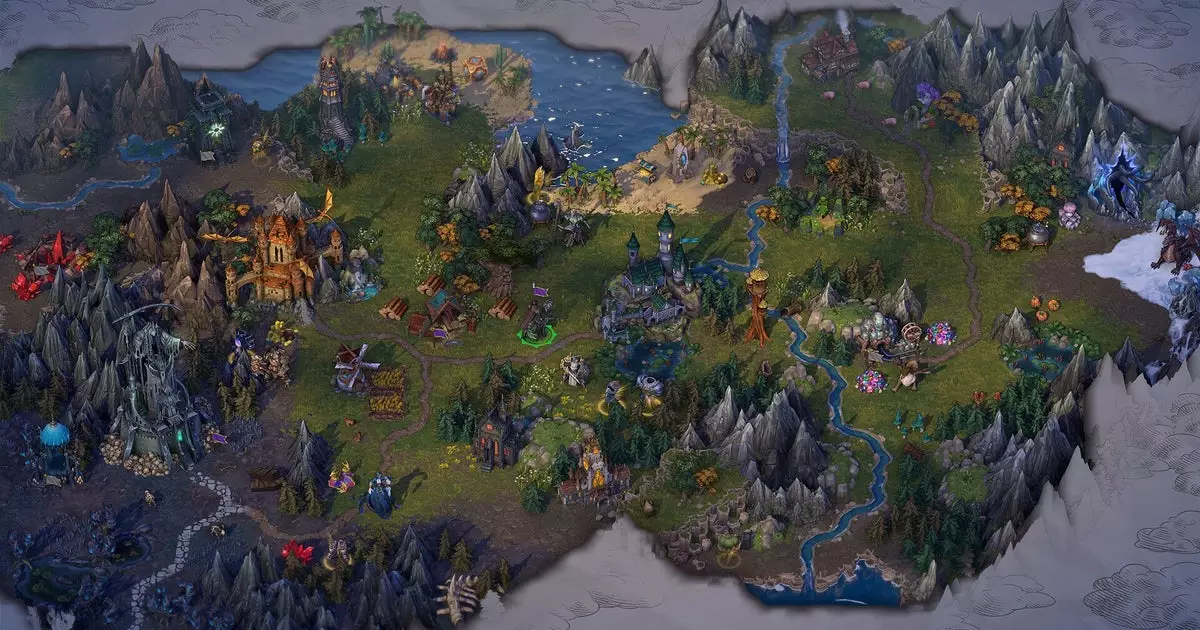In an industry where monumental corporations often dominate with their vast resources, the decision by Ubisoft to transfer the publishing duties of *Heroes of Might and Magic: Olden Era* to Hooded Horse is both intriguing and revealing. Traditionally, Ubisoft handles the publishing and marketing of its beloved franchises, leveraging its extensive infrastructure to maintain a consistent presence. Yet, here we see a strategic pivot, one that hints at a deeper internal reevaluation.
This move underscores a broader trend among AAA publishers: decentralizing certain projects to specialized entities. Ubisoft’s choice to partner with Hooded Horse, a boutique publisher known for niche strategy titles, demonstrates a willingness to experiment with risk management and resource allocation. Perhaps the company recognizes that, for certain legacy or revitalization projects, leaner, focused publishers can better serve the specific needs of a nostalgic community, freeing Ubisoft to concentrate on newer, high-profile releases.
Furthermore, this decision may reflect internal challenges faced by Ubisoft — patience with delays, cash flow considerations, or a strategic shift away from traditional publishing roles. Ubisoft’s internal restructuring, such as its split into separate entities, indicates that even industry giants are feeling the pressure to adapt, sometimes by outsourcing to third-party publishers who can offer agility and targeted market reach.
The Implications of Outsourcing Legacy Titles
By handing over the reins to Hooded Horse, Ubisoft effectively acknowledges that certain properties no longer require or warrant full-fledged internal support. Instead, they’re leveraging the expertise of publishers who have carved out their niche in strategy gaming — a move driven by economics and segmented market targeting.
Hooded Horse’s reputation for raising visibility on niche titles suggests a savvy understanding of underrepresented audiences. Their involvement could inject fresh energy into *Heroes of Might and Magic*, perhaps even attract new gamers who might overlook a traditional Ubisoft release. For Unfrozen, the development studio behind the game, collaborating with Hooded Horse promises marketing muscle, regional outreach, and the ability to navigate the ever-fragmented digital landscape more effectively.
However, this also raises questions about the broader industry trend: are current corporate giants increasingly outsourcing niche titles to specialized firms, thus streamlining their own portfolios and reducing overheads? Could this pattern lead to a future where legacy franchises become more dependent on third-party publishers, rather than direct corporate stewardship? The answer may reveal the shifting power dynamics within game publishing, with boutique entities becoming the gatekeepers of beloved classics.
Nostalgia Versus Innovation: Navigating the Old and the New
The reimagining of *Heroes of Might and Magic* as *Olden Era* is emblematic of the ongoing tension between nostalgia and innovation. Developers aim to return the series to its roots — a move likely intended to satisfy longtime fans who feel the franchise has drifted from its classic essence. This desire for authenticity is understandable; many gamers yearn for the golden days of turn-based strategy, where the mechanics and lore were king.
Yet, this quest for historical fidelity comes with inherent risks. Nostalgia can be a double-edged sword; it draws in a dedicated base but may alienate newcomers unfamiliar with decades of lore. The hesitation of some gamers, including myself, stems from the fear that the game might become a relic, overly steeped in legacy that feels inaccessible to modern players.
The industry’s challenge is balancing reverence for the past with fresh gameplay experiences. Titles like *Olden Era* serve as tests to see whether returning to roots is enough to reinvigorate a franchise or whether innovation must also be embraced. In this case, outsourcing publishing to Hooded Horse might be a strategic attempt to specialize the marketing approach and better target the core audience, while the developers focus on crafting authentic gameplay.
This scenario with Ubisoft and Hooded Horse encapsulates a broader evolution in how legacy games are maintained and promoted. Big publishers are increasingly recognizing the value of partnerships, especially with entities that understand niche markets deeply. Whether this will lead to revitalized classics or fragmented management remains to be seen.
What is evident is that the traditional model of in-house publishing is no longer sacrosanct. The move shields legacy titles from the internal churn and provides them with a more tailored approach, which might ultimately breathe new life into long-standing franchises. If successful, this strategy could herald a future where niche publishers become the custodians of gaming history, blending old-school charm with modern marketing finesse. It’s a bold gamble — but one that holds the promise of creating a more diverse and resilient industry landscape.

